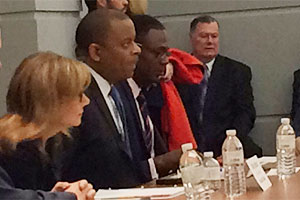Senior Reporter
Autonomous Vehicle Panelists Acknowledge Technology’s Impact on Labor

WASHINGTON — Leaders from the trucking and auto industries, local governments, technology and safety firms and academia pledged to ensure innovations in self-driving vehicles will not disrupt labor markets and urban landscapes.
The two dozen stakeholders met at U.S. Department of Transportation headquarters Jan. 16 to launch the Advisory Committee on Automation in Transportation’s effort in shaping a national policy aimed at safeguarding workers, commuters and businesses.
American Trucking Associations President and CEO Chris Spear, a member of the committee, said the transportation sector must embrace technology for the “betterment of safety, the environment, productivity, but also to do it thoughtfully, in ways that do not impede our employment base, particularly in the trucking sector.”
Oklahoma City Mayor Mick Cornett (R), and Ed Wytkind, president of the transportation trades department at the AFL-CIO, along with other members, echoed Spear’s sentiment of protecting the transportation workforce as cities embrace self-driving vehicles.
The committee intends to meet throughout the year at DOT headquarters and possibly at the offices of its members. The committee’s co-chairmen are General Motors Chairman and CEO Mary Barra, and Los Angeles Mayor Eric Garcetti (D). Other members include Gloria Boyland, corporate vice president at FedEx Corp.; Debbie Hersman, president and CEO of the National Safety Council; and John Zimmer, co-founder and president of Lyft.
Chris Gerdes, professor of engineering at Stanford University, and the committee’s vice chairman, did not indicate when the panel would propose guidelines.
In introducing the committee, Secretary of Transportation Anthony Foxx said advancements in automation have a “transformative power” that merits policy guidelines beneficial for every road user.
“Our goal is to figure out what lines of symmetry exist between different modes of transportation in this area that we can work from as a department,” Foxx said.
Last fall, the National Highway Traffic Safety Administration issued guidelines on autonomous cars, outlining state and federal roles managing the technology.
In October, a self-driving truck developed by Otto, a subsidiary of Uber Technologies Inc., hauled Budweiser beer about 120 miles on Interstate 25 in Colorado. The next month, a semi-autonomous truck, also from Otto, performed a similar task in Ohio.
Nevada’s Office of Economic Development runs the Center for Advanced Mobility to develop and deploy autonomous vehicle policy, standards and technology.

